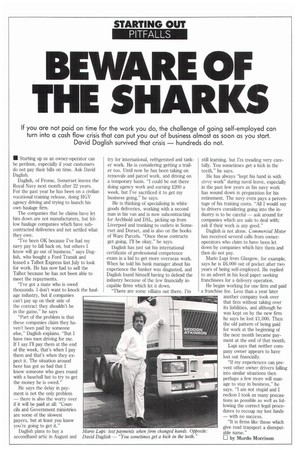BEWARE OF THE SHARKS
Page 56

If you've noticed an error in this article please click here to report it so we can fix it.
If you are not paid on time for the work you do, the challenge of going self-employed can turn into a cash flow crisis that can put you out of business almost as soon as you start. David Daglish survived that crisis — hundreds do not.
• Starting up as an owner-operator can be perilous, especially if your customers do not pay their bills on time. Ask David Daglish.
Daglish, of Frome, Somerset leaves the Royal Navy next month after 22 years. For the past year he has been on a civilian vocational training release, doing HGV agency driving and trying to launch his own haulage firm.
The companies that he claims have let him down are not manufacturers, but fellow haulage companies which have subcontracted deliveries and not settled what they owe.
"I've been OK because I've had my navy pay to fall back on, but others I know will go out of business," says Daglish, who bought a Ford Transit and leased a Talbot Express last July to look for work. He has now had to sell the Talbot because he has not been able to meet the repayments.
"Part of the problem is that these companies claim they haven't been paid by someone else," Daglish explains. "But I have two men driving for me. If I say I'll pay them at the end of the week, that's when I pay them and that's when they expect it. The situation around here has got so bad that I know someone who goes round with a baseball bat to try to get the money he is owed."
He says the delay in payment is not the only problem — there is also the worry over if it will be paid at all: "Councils and Government ministries are some of the slowest payers, but at least you know you're going to get it."
Daglish plans to buy a secondhand artic in August and try for international, refrigerated and tanker work. He is considering getting a trailer too. Until now he has been taking on removals and parcel work, and driving on a temporary basis. "I could be out there doing agency work and earning 2200 a week, but I've sacrificed it to get my business going," he says.
He is thinking of specialising in white goods deliveries, working with a second man in his van and is now subcontracting for Archbold and DSL, picking up from Liverpool and trunking to outlets in Somerset and Dorset, and is also on the books of Ware Parcels. "Once these contracts get going, I'll be okay," he says.
Daglish has just sat his international certificate of professional competence exam in a bid to get more overseas work. When he told his bank manager about his experience the banker was disgusted, and Daglish found himself having to defend the industry because of the few financially incapable firms which let it down.
"There are some villains out there. I'm
still learning, but I'm treading very carefully. You sometimes get a kick in the teeth," he says.
He has always "kept his hand in with civvy work" during naval leave, especially in the past few years as his navy work has wound down in preparation for his retirement. The navy even pays a percentage of his training costs. "All I would say to drivers considering going into the industry is to be careful — ask around for companies which are safe to deal with; ask if their work is any good."
Daglish is not alone. Commercial Motor has received several calls from owneroperators who claim to have been let down by companies which hire them and then do not pay.
Mario Lupi from Glasgow, for example, says he is 26,000 out of pocket after two years of being self-employed. He replied to an advert in his local paper seeking franchisees for a delivery operation.
He began working for one firm and paid a franchise fee. Less than a year later another company took over that firm without taking over its liabilities, and although he was kept on by the new firm he says he lost 21,000. Then the old pattern of being paid for work at the beginning of the next month became payment at the end of that month.
Lupi says that neither company owner appears to have lost out financially.
"If my experiences can prevent other owner drivers falling into similar situations then perhaps a few more will manage to stay in business," he says. "1 am not stupid and I reckon I took as many precautions as possible as well as following the correct legal procedures to recoup my lost funds — with no success.
"It is firms like these which give road transport a disreputable name."
CI by Murdo Morrison


























































































































